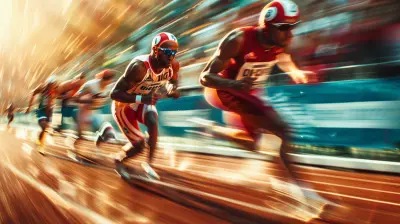The Impact of Charity Sports on Mental Health Initiatives
20 August 2025
Whether it’s running a 5K for a local mental health nonprofit or organizing a charity basketball game to raise awareness, sports events are becoming real game-changers for mental health in our communities. You’ve probably seen one of those charity marathons where thousands of people gather for a cause, wearing matching tees and proudly sporting race numbers. It’s not just about the miles logged or the money raised—there’s so much more going on behind the scenes.
Charity sports events are quietly but powerfully changing the mental health conversation. They’re driving real action, opening up dialogue, and even helping improve mental well-being for both participants and spectators. Crazy, right? That running shoes and a hoop can be part of mental health advocacy?
Let’s break it all down and see how these athletic fundraisers are making such a huge difference in an era where mental health needs all the support it can get.
What Are Charity Sports Events, Really?
Before we dive into the mental health stuff, let’s clear up what we mean by charity sports. We’re not just talking about professional athletes donating proceeds from games—though that’s cool too. Charity sports events can include:- Community fun runs or walks
- Charity bike rides
- Sponsored swims
- Celebrity soccer matches
- Fitness challenges that raise funds (like push-up or squat challenges)
- Virtual races or online competitions
The key factor? These events are centered around physical activity and are organized to support a charitable cause—especially ones tied to mental health.
Why Sports and Mental Health Go Hand-In-Hand
Here’s the thing—there’s already a mountain of research showing that physical activity is good for your mind. It pumps up feel-good chemicals like endorphins, helps reduce anxiety, and can even reload your brain’s stress management batteries.Now, mix that with a sense of community, a cause that means something, and a shared goal to do good? That’s mental health gold.
Think about it like this: running alone clears your head, but running with hundreds of people for suicide prevention? That plants seeds of hope and connection.
Breaking the Stigma — One Event At a Time
A lot of people still feel weird talking about mental health. It’s improving, but there’s a long way to go. Charity sports events help crack that shell in a few awesome ways:1. They Normalize the Conversation
When you slap “Depression Awareness” on a marathon T-shirt and thousands show up to wear it proudly, it sends a serious message: mental health matters, and you're not alone.People see famous athletes, celebrities, and everyday folks aligning themselves with mental health causes. It signals that it's okay to talk about your struggles. It chips away at the stigma, one step at a time.
2. They Create Safe Spaces
Ever notice how it's easier to talk about deep stuff when you’re doing something active? Maybe it's the fresh air, the movement, or just not staring someone in the face the whole time. Charity sports events often help people open up in ways they couldn’t in a therapist’s office or at the dinner table.They create a vibe that says, “We’re all in this together.”
Real-Life Impact: Stories That Stay With You
If you’ve ever participated in a charity sports event, you probably have a story. Maybe you ran for a friend who died by suicide. Maybe your team raised money for a local youth crisis center. These stories are powerful—and they’re everywhere.Some events even invite people to share why they’re participating, turning the entire thing into a kind of living tribute and collective healing process. That emotional connection? It’s unforgettable.
Fundraising that Fuels Mental Health Programs
Let’s not forget the practical side of all this. Charity sports aren’t just about awareness—they bring in serious cash for mental health causes. And guess what? Every dollar counts.Here’s where those funds go:
- Offering free or low-cost counseling services- Providing suicide prevention training
- Funding school programs on emotional well-being
- Supporting crisis helplines
- Building peer-support networks
Without the financial boost from these events, many of these programs might not even exist. So every mile run, every lap swum, every hoop shot—it’s all fueling something much bigger.
The Ripple Effect of Participation
What’s really special about charity sports is that the impact goes far beyond the day of the event.1. Empowering Individuals
Signing up for a race, training, setting a goal—it gives people a sense of purpose. For someone struggling with depression or anxiety, that’s a giant deal. It creates structure, motivation, and a reason to get out of bed in the morning.2. Building Support Networks
You train together, sweat together, cry together, laugh together. The friendships formed during these events often last way beyond the finish line. And let’s be real—one solid friendship can save a life.3. Inspiring Others
When people see their neighbors or coworkers getting involved, it inspires them to step up too. It’s contagious—in the best way. The more who join, the louder the message becomes.The Role of Athletes and Influencers
Love them or not, celebrities and pro athletes hold a ton of influence—and when they lend their voice to mental health through charity sports, people listen.We’ve seen stars like Michael Phelps, Naomi Osaka, and Kevin Love open up about their mental health struggles. Now imagine them participating in a mental health charity game. That kind of visibility? Priceless.
They put a face to the cause, reminding fans, “If they can struggle and seek help, so can you.”
Digital Shift: Virtual Events and Online Communities
COVID-19 shook up how we gather, but it didn’t stop the momentum of charity sports. People moved online—and boy, did they show up.Virtual races, fitness challenges on Instagram, charity livestreams on Twitch—all of them are proving that you don’t need to be in a stadium to make an impact. In fact, going digital made these events more inclusive.
People with mobility issues? Folks from rural areas? Introverts? Now they can all join the movement from wherever they are.
And the best part? Online communities built around these events often keep going long after the event ends.
Challenges and How We Can Do Better
Of course, charity sports aren’t perfect. There are hurdles (pun intended):- It's easy to get caught up in the hype and lose focus on the cause.
- Some events favor physical ability—leaving out those who can’t participate in traditional ways.
- Not all charity events are transparent about where the money goes.
But these are things we can work on. With more inclusivity, better communication, and a genuine focus on impact over image, charity sports can become even more powerful.
So... Why Should You Care?
Look, mental health isn’t just “someone else’s problem.” We all have minds, brains, emotions—right? And we all live in communities that need support.By joining a charity sports event—whether as a runner, donor, volunteer, or cheerleader—you’re doing more than just showing up. You’re helping normalize the conversation, fund life-saving programs, and be part of a movement that says mental health matters.
And who knows? It might just help your own mental health, too.
Getting Involved: Simple Steps to Make a Difference
Thinking of getting involved? Here’s how to dip your toes in:1. Start Small: Sign up for a local charity walk or run. Don’t worry about your pace—just show up.
2. Volunteer: Not into running? No problem. Events always need help with setup, registration, water stations—you name it.
3. Organize Your Own Event: Something as simple as a backyard yoga fundraiser or an online fitness challenge can make a difference.
4. Donate or Share: Can’t participate? Sharing the event online or making even a small donation still supports the cause.
5. Talk About It: Share why you're getting involved. Your story might be the exact thing someone else needs to hear.
Final Thoughts: Sweat with a Purpose
Charity sports events are more than fun runs and group workouts. They’re powerful tools for change—uniting people, funding solutions, and breaking down serious mental health barriers. In a world where so many feel alone or overwhelmed, lacing up your sneakers might seem like a small act.But when it’s done for a cause, with others, and with heart?
It becomes something truly transformative.
So the next time you see an event happening in your town—or even online—ask yourself: “What if I joined?” You might just be surprised by how good it feels to sweat for something bigger than yourself.
all images in this post were generated using AI tools
Category:
Charity GamesAuthor:

Ruben McCloud
Discussion
rate this article
1 comments
Courtney Alvarez
Fascinating connection! How can sports further support mental health?
September 8, 2025 at 11:41 AM

Ruben McCloud
Sports can promote mental health by fostering community, encouraging physical activity, and providing a positive outlet for stress. Engaging in team activities also helps build social connections, which are essential for mental well-being.


